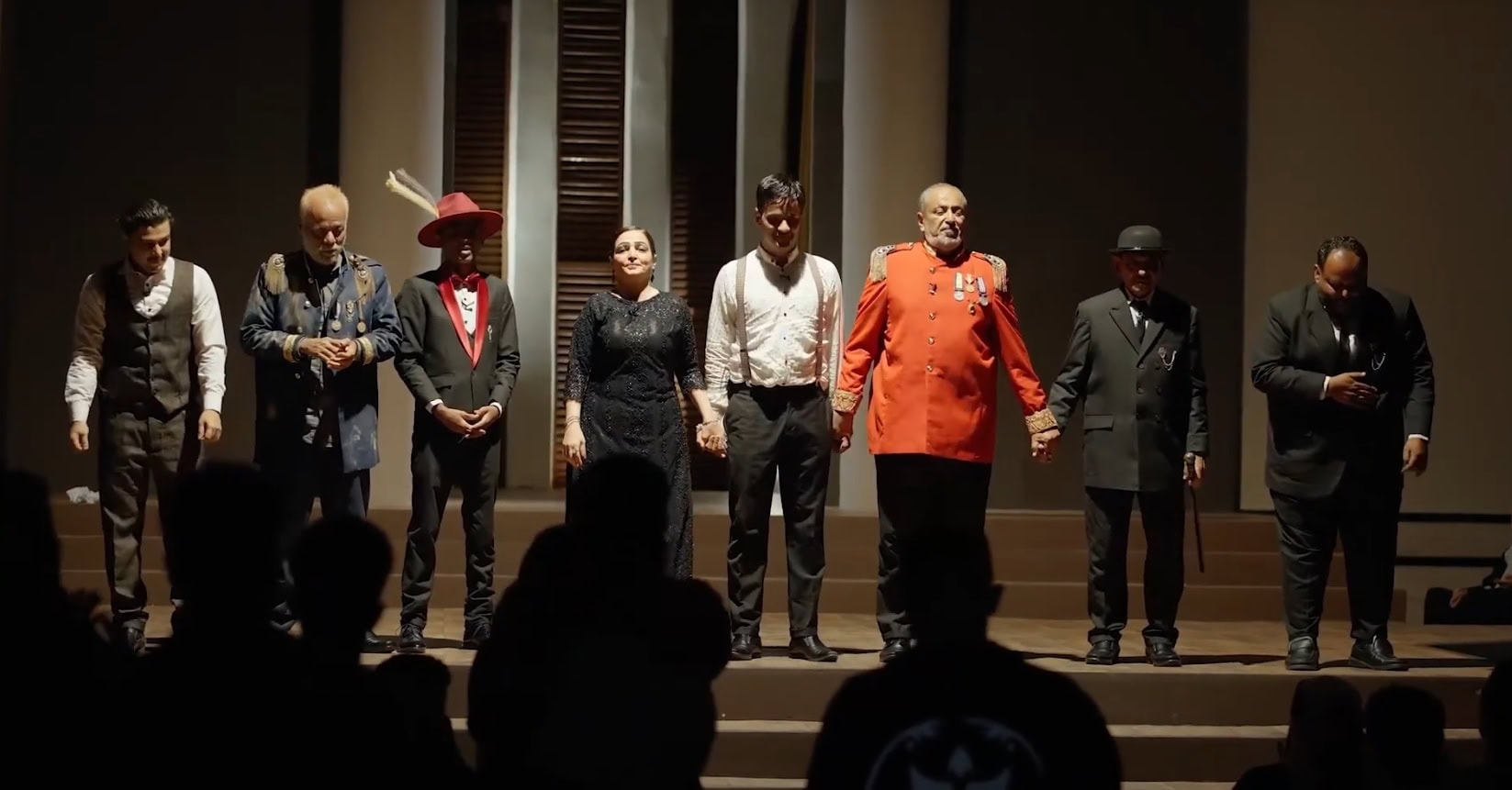
Shakespeare’s ’Hamlet‘ performed by the ’Gulf of Aden Troupe‘ in the historical Legislative Council Building in Aden between January 7-16, 2023 (Pic courtesy The Gulf of Aden’s YouTube channel)
12-05-2025 at 2 PM Aden Time

|
|
Reem Al-Fadhli (South24)
It has been reported that theater was introduced to South Yemen in 1904 through an Indian troupe that visited Aden during the era of British colonial rule. The Indian community received the troupe and established a special theater for it to perform its plays in the famous ’Mr. Hamoud Building‘ in ’Hafat Al-Qatee‘ in Crater. However, Southern historian Saeed Al-Awlaki in his book ‘Seventy Years of Yemeni Theater’, says that South Yemen was probably familiar with theater, particularly theatrical writing, since the 16th century. He cites a study authored by ’Omar Awad Bamatraf‘ which includes an old theatrical text by jurist ’Abdullah Bin Omar Bamakhramah‘ titled ’Hadramout and the Son’.
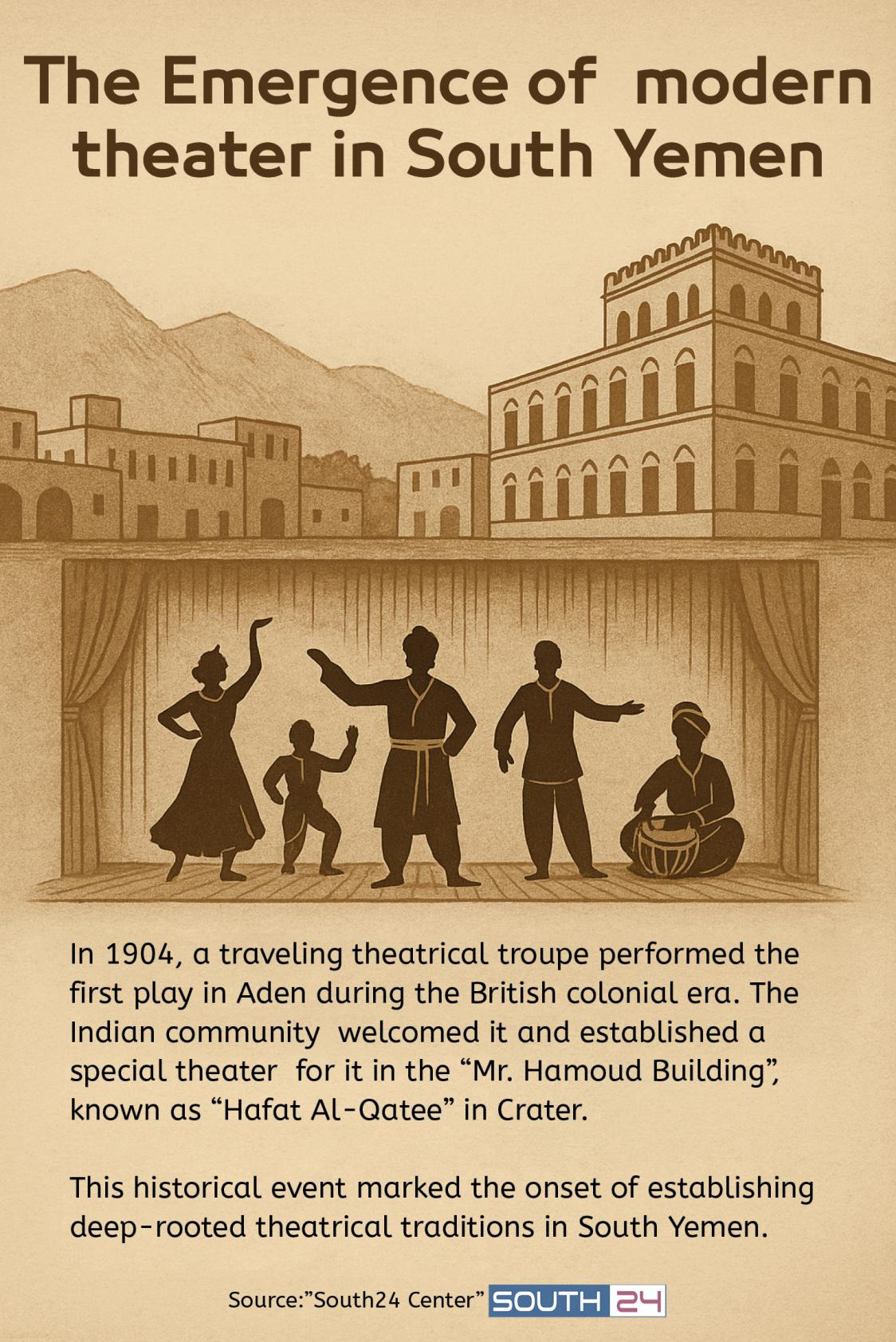
The Emergence of Modern Theater in South Yemen
In 1904, a traveling theatrical troupe from India performed the first play in Aden during the British colonial era. The Indian community welcomed it and established a special theater for it in the ’Mr. Hamoud Building‘, known as ’Hafat Al-Qatee‘ in Crater.
This historical event marked the onset of establishing deep-rooted theatrical traditions in South Yemen.
Despite the different accounts about the emergence of theater in South Yemen, the first documented Arabic play was performed in Aden in 1910 by the ’Hikma School’s Students Troupe‘. It was based on a translation of Shakespeare’s play ’Julius Caesar‘ by Mohammed Hamoud Bin Hussein Al-Hashimi, who is known as ’Mr. Mahmoud‘ and who along with his sons played a major role in Aden’s theatrical, artistic, and cultural work.
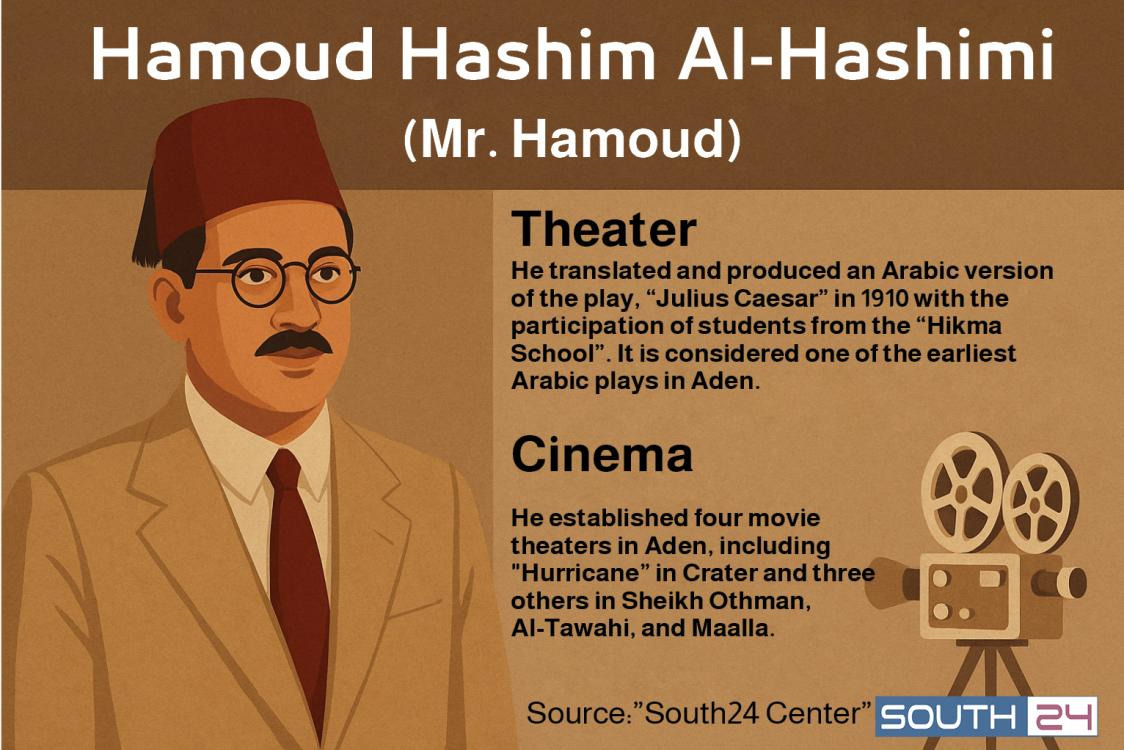
Hamoud Hashim Al-Hashimi (Mr. Hamoud)
Theater
He translated and produced an Arabic version of the play, ’Julius Caesar‘ in 1910 with the participation of students from the ’Hikma School‘. It is considered one of the earliest Arabic plays in Aden.
Cinema
He established four movie theaters in Aden, including ’Hurricane‘ in Crater and three others in Sheikh Othman, Al-Tawahi, and Maalla.
The Adeni Theater
Theatre artist and Director of the Theater Department in the Cultural Office in Aden, Fouad Howaidi, told ’South24 Center‘ that “serious thought began to be given about establishing a local theatrical movement with the performance of Arabic plays that were mainly characterized by their poetical nature, along with simple local texts, but it was a good start.”
Howaidi emphasized that “such attempts continued for several years till the emergence of the first theatrical troupes that performed plays such as ‘Julius Caesar’ and ‘The King is the King’. The pioneers of this theatrical movement included prominent Adeni figures such as Allambo, Al-Durani, Rabbu, Al-Mansab, and others who contributed to the development of local theater.” He added that this became an incentive to many theater lovers to establish theatrical troupes in different districts of Aden.
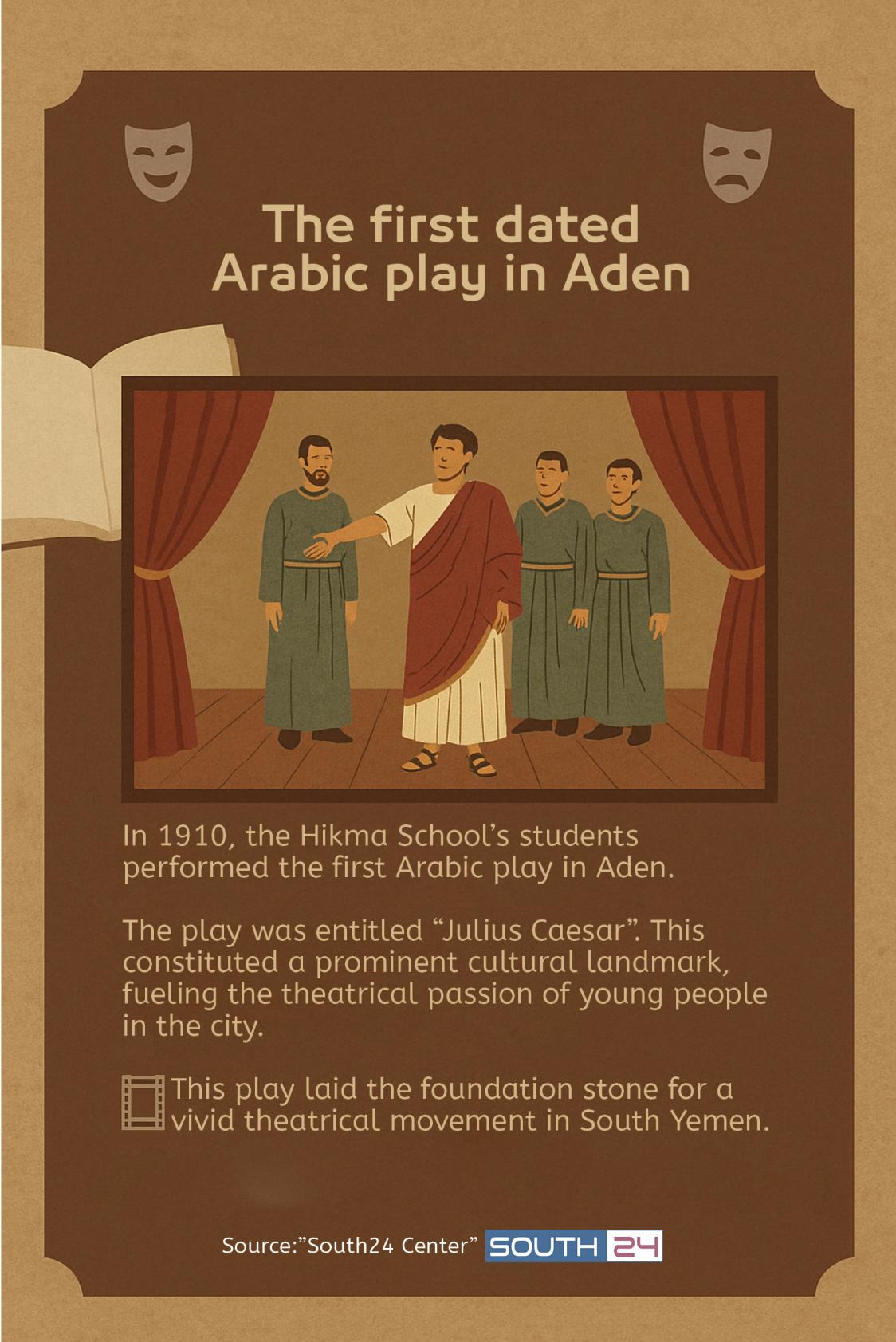
The first documented Arabic play in Aden
In 1910, students of Hikma School performed the first Arabic play in Aden, the play was titled ’Julius Caesar‘ and constituted a prominent cultural landmark, helping fuel the passion for theater among young people in the city, and this play laid the foundation for a vivid theatrical movement in South Yemen.
According to director and actress Ansaf Elwi, “the plays performed by the foreign troupes carried ideological messaging aiming to create community acceptance for the foreign presence at a time when the British colonial project was seeking to plant its feet firmly in Aden”.
She told ‘South24 Center’: “The performances included a mixture of East Asian folklore from India, China, and Indonesia. However, they had clear political purposes which were felt by some intellectuals at the time.”
Theatrical activities reached their peak in the late 1950s prior to the eruption of the October 14 Revolution. The establishment of three prominent theatrical troupes in Aden, including the ’Arab Acting Authority Troupe‘, the ’Arts and Drama Authority Troupe‘, and the ’Comic Masafi Troupe‘, played a key role in reviving theatrical art following years of hiatus. It returned strongly to the forefront of the cultural scene in the city.
Ansaf Elwi noted that the real theatrical transformation began after the October Revolution in 1963 against British colonialism as it became a tool to raise awareness and develop the society, supported by strong ties with countries such as China, the Soviet Union, and East Germany.
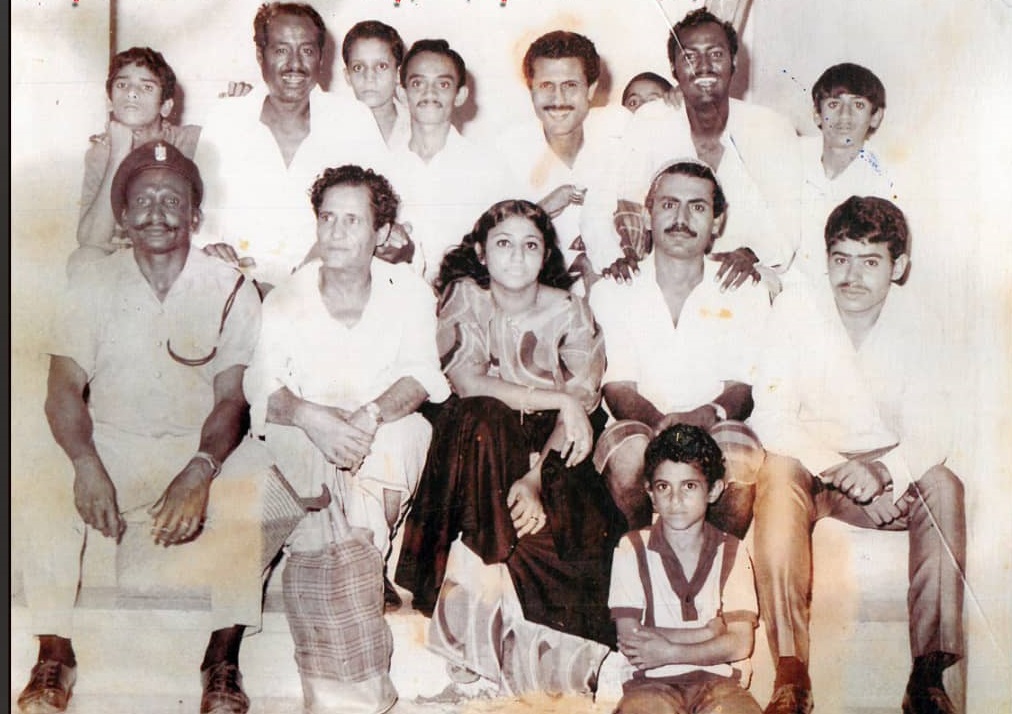
The ‘Comic Masafi Troupe‘ in Aden in the 1970s- Archive.
She added: “During that period, Aden witnessed a true cultural renaissance. Each ministry had its own theater, such as the ministries of Agriculture, Defense, and Economy. We performed plays that addressed issues related to agriculture, self-sufficiency, women's rights, and multiculturalism, all of which carried meaningful social and political messages.”
According to her, “The National Theater in Aden was in harmony with the cultural and political orientation at that period. Moreover, the Institute of Fine Arts, founded by Jameel Ghanem in 1973, was one of the most important institutions that contributed to shaping a new theatrical generation. I was lucky to be among those who were taught by Iraqi trainers. I participated, along with colleagues such as Narjes Abbad, Iman Taher, and Soad Al-Junaidi, to perform several plays.”
Actor Fouad Howaidi emphasized that in the 1970s theater enjoyed wide governmental support. The National Theater Troupe was established in the 1970s with a ministerial decree. This led to the emergence of the golden age of theater, marked by the competition among the troupes as well as the holding of annual theater festivals across South Yemen’s governorates. This is in addition to international participation which enhanced Aden’s theatrical status at the Arab and international levels.
Theater in Hadramout
Theater wasn’t limited to Aden. Hadramout governorate too witnessed significant theatrical activities in the 1940s till the late 1950s mainly through school theater. This was thanks to the educational missions of Sudanese teachers and Hadrami graduates, according to the book ’Seventy Years of Theater in Yemen’.
Theater in Hadramout is one of the oldest art forms that has seen significant activity since the 1950s, according to Yahya Al-Qatawi, Director of the Theater Department in the Hadramout Cultural Office.
He told ’South24 Center‘ that “Hadrami theater witnessed major activity during the Qu’aiti Sultanate era, as that period was characterized by distinctive theatrical works”.
He added that “During the subsequent decades, especially in the 1970s and 1980s, prominent artistic figures came into prominence such as Yahya Omar, Salem Saqar, Mohammed Bin Salem, Abdulhadi Al-Tamimi, and Ahmed Barijah. They contributed to establishing a strong theatrical base. Furthermore, important plays were performed such as ‘Al-Sahwah’ (Awakening), ‘Al-Zilzal’ (The Earthquake), and ‘Mesmar Juha’ (Juha’s Nail).’”
According to theatrical director Walid Bathfili, the period between 1970s and 1990s was the golden age of theater in South Yemen due to governmental support that used the arts for social and political awareness. He told ’South24 Center‘ that theater at that time addressed issues such as colonialism, justice, and unity. He pointed to the incident of burning the British flag during a play performed in the Middle School in Ghayl in the presence of a British delegation. It was the spark that ignited the revolution against colonialism.
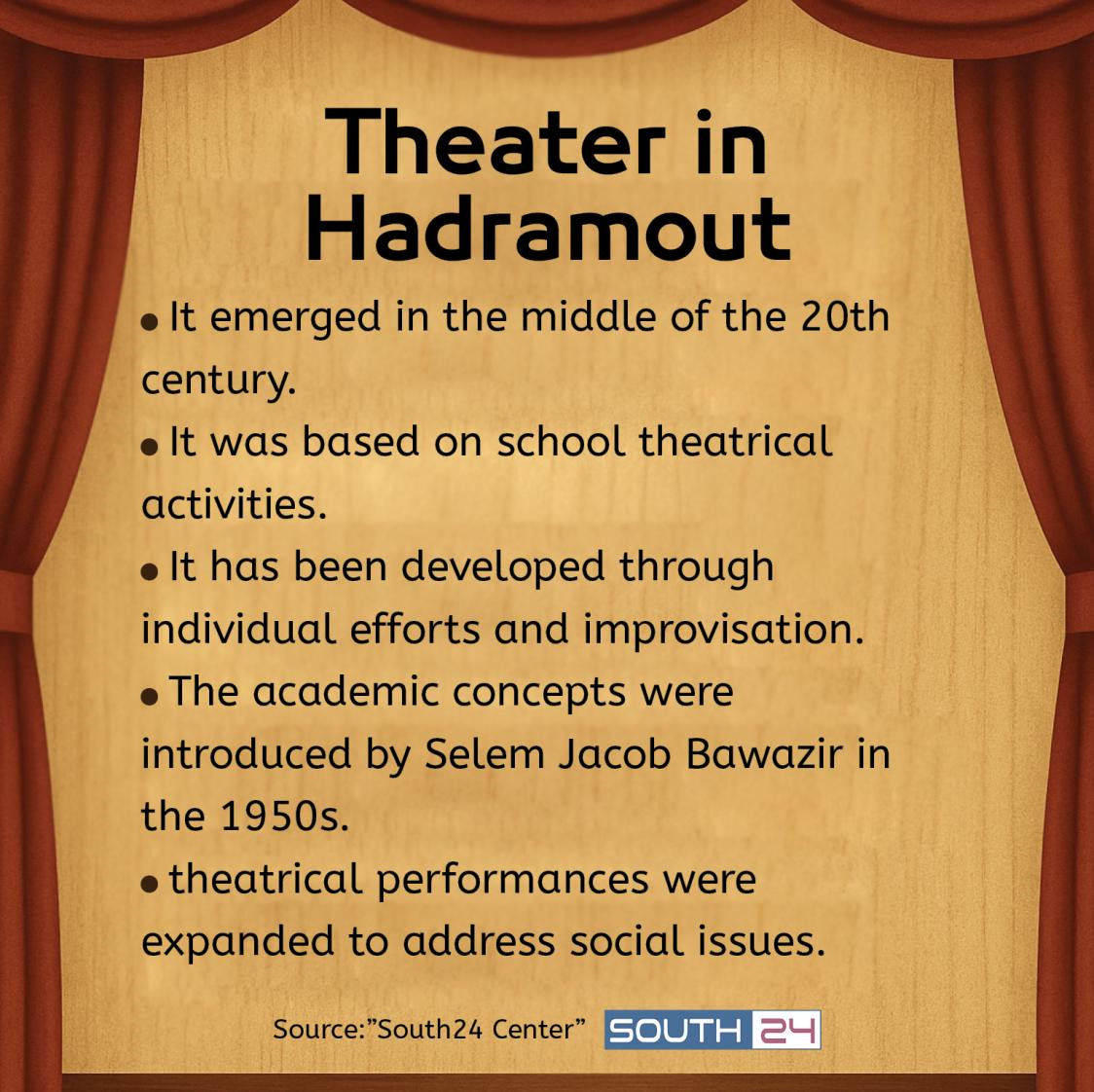
Theater Suffered a Setback during the Yemeni Unity Era
Theater in South Yemen witnessed a systematic deterioration after the Yemeni unity in 1990, according to Fouad Howaidi. There was decline of support to cultural and theatrical activities, especially after war erupted in the summer of 1994 which ended with the Northern forces invading Aden and Hadramout. According to him, “Most theatrical troupes were dissolved and the financial support was ceased in light of the governmental policy of neglecting the arts. This led to the decline of theater in Aden and South Yemen.”
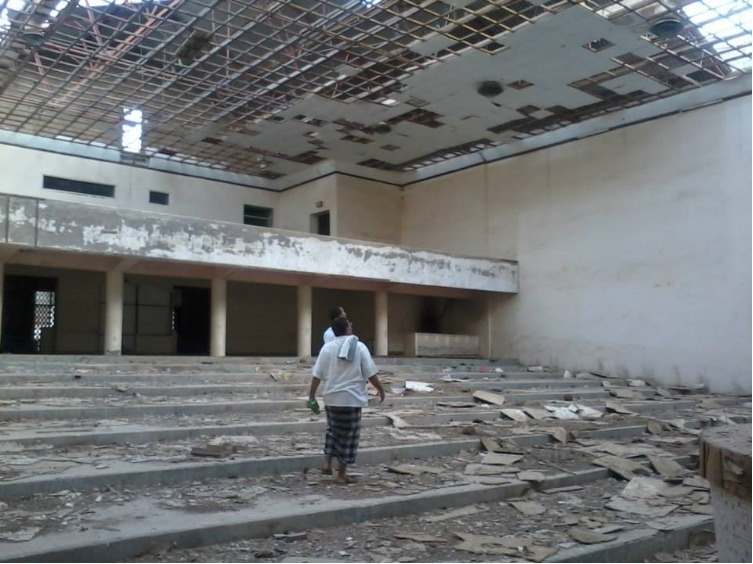
A photo showing the ruin and neglect of the National Theater in Al-Tawahi (owned by the family of Mr. Hamoud) in Aden-March 2014.
Al-Qatawi emphasized that the theatrical archives in Hadramout suffered extensive damage, especially after the war in the summer of 1994. Furthermore, the poor governmental support and the repeated relocation of offices and headquarters led to the loss of rare documents and works.
He added: “After 1994, budgets and institutional support ceased and the official interest in theater declined, despite individual attempts by local directors and authors, foremost of whom were Omar Hasson and Mohammed Awad. The majority of theatrical productions were carried out through self-funding amid the lack of infrastructure such as official theaters. The theatrical troupes were forced to perform in small venues or wedding halls.“
Theater in South Yemen, especially the school children’s theater, was considered one of the most prominent tools in the anti-colonialism struggle and to raise awareness and educate society, according to director Ansaf Elwi. However, this too witnessed a remarkable decline after the war in 1994 as the Saleh regime deliberately sought to remove all forms of Southern identity.
Weak Production
The weak state of theatrical production in South Yemen continued for decades. Despite attempts at revival through some theatrical troupes to restore activities between 1990-2015, these efforts were limited. The latest war against South Yemen in 2015 has aggravated the decline and further complicated the scene.
However, despair didn’t completely dominate the scene. In January 2023, the ’Gulf of Aden Troupe‘ revived hopes for a comeback of theater in Yemen, with its performance of William Shakespeare's ’Hamlet‘ in Aden, with support from the British Cultural Council. The play, which was performed in Adeni dialect and distinctive style, was hosted at the historical Legislative Council Building and enjoyed a large turnout.
The play was directed by Yemeni filmmaker Amr Jamal, who is known for his film ’10 Days Before the Wedding, which lent a professional artistic dimension to the play.
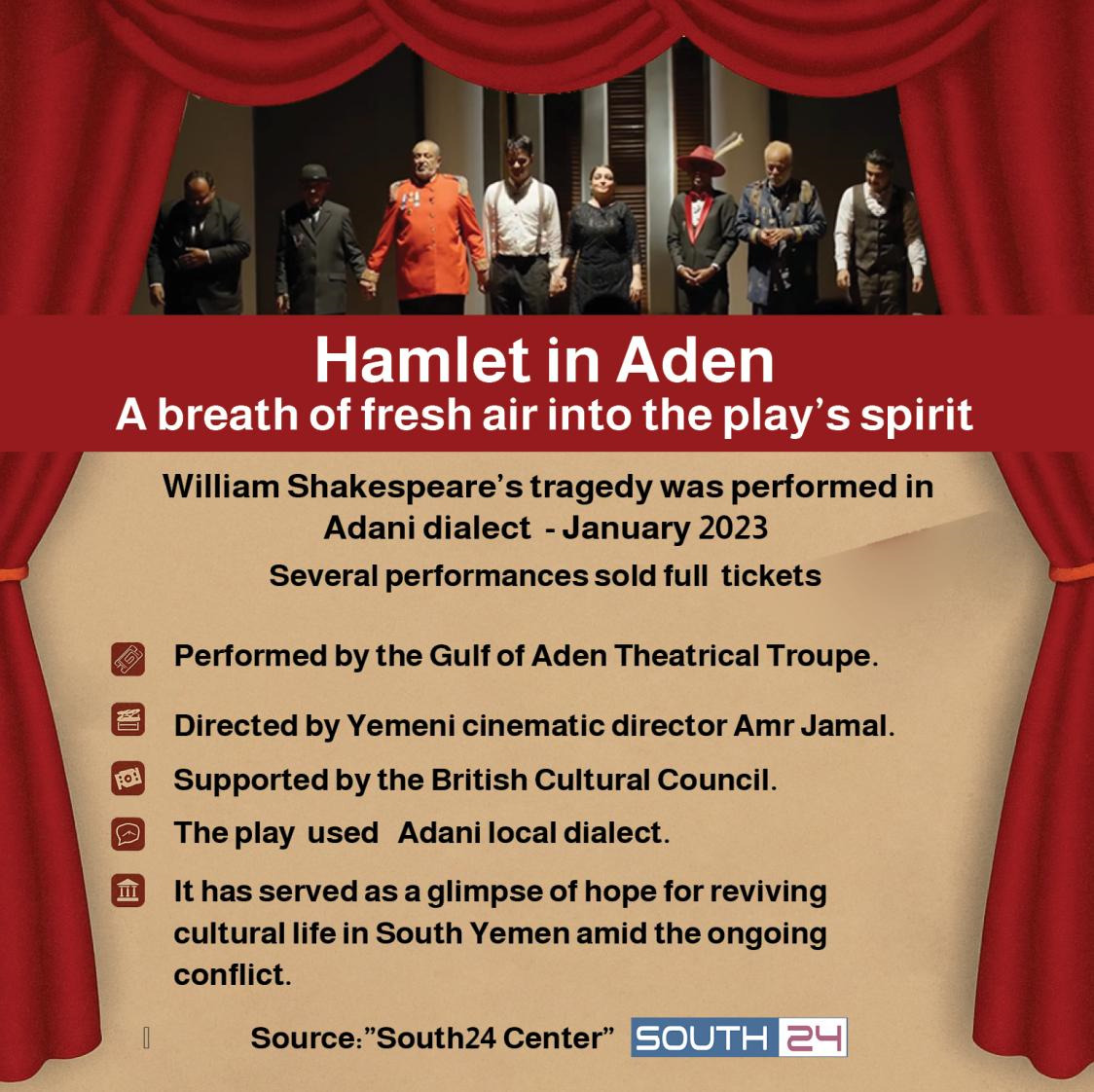
Through evoking the moral dilemmas and power conflict in Shakespeare’s classic, the play resonated deeply with Southerners who have been enduring years of an ongoing war. The play became an important cultural symbol, and reflected the society’s yearning for artistic life. The play brought to life the ability of theater to survive in South Yemen and renew itself notwithstanding the risks and hardships.
However, this play would not have been possible without British support, which denotes a huge failure by the Yemeni Ministry of Culture.
Hopes and a Call for Change
Theatre professionals in South Yemen have to contend with many challenges, including lack of production and poor support, in addition to the low turnout at commercial theaters. Actor Hadeel Abdulhakim told ’South24 Center‘ that theater in South Yemen is witnessing a significant decline as it has now taken the form of performing short sketches at graduation parties or during awareness campaigns, which is a far cry from the active period it witnessed, especially in Aden before the war.
He believes that individual attempts to revive theater, especially during celebratory feasts, often lack sustainability and support.
Abdulhakim expressed his sorrow over the larger neglect of theater by officials despite the holding of scattered cultural and artistic events. He stressed that the Ministry of Culture is capable, despite its troubles, of allocating a small fraction of its attention to this important sector. He concluded: “We hope that the relevant authorities will pay attention to theater which deserves the opportunity to return as a lever for creating awareness and cultural identity.”.
For his part, director and author Marwan Mafriq said that theatrical production requires a stage and stable infrastructure. He emphasized that while the state formerly supported theater through establishing institutes, movie theaters, and sending artistes abroad, now all of this is missing due to the political circumstances.
Mafraq called upon the Ministry of Culture to fulfil its real role, and described their demands as “simple” and the minimum commitment required for theater. He expressed the hope for a change that would restore the status of art and theater through supportive infrastructure, by involving experts, organizing artistic events, and sending talents abroad.
Despite the many obstacles facing theater in South Yemen, including institutional neglect and the ramifications of war, the flame of theatrical creativity is alive in the hearts of artistes and intellectuals. The recent experiments, such as the performance of ’Hamlet‘ in Adeni dialect, have proved that the Southern theater is capable of rising again if provided a nurturing environment and real support.
Today, theater in South Yemen stands at a critical crossroads – it needs to either reassert itself as a cultural lever and a tool for social enlightenment, or risk extinction under the brunt of continuous neglect. Restoring the historical role of the Southern theater requires serious political and cultural will and a strategic vision to invest in people and place, so as to revive theater which reflects the dreams and aspirations of these enduring people.